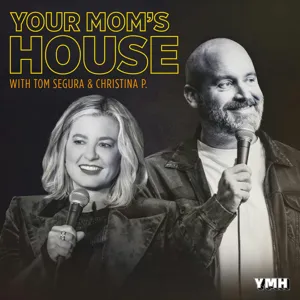Podcast Summary
Embracing contentment and nurturing relationships: During challenging times, focusing on personal growth and fostering strong connections can lead to inner peace and contentment
Contentment and discontentment can coexist, even during goal-directed activities and challenging times. Instead of feeling driven by a lack, we can strive for contentment and fulfillment. This counterintuitive practice, which goes against the capitalist paradigm, can lead to deeper exploration of personal growth and relationships. During the discussion, the hosts touched on the impact of the pandemic on relationships and the importance of maintaining and strengthening them. They also mentioned an upcoming workshop focused on the "strong heart," which encompasses caring, kindness, compassion, and decency. In essence, the conversation highlighted the significance of embracing contentment and nurturing relationships, especially during difficult periods. By focusing on personal growth and fostering strong connections, we can navigate life's challenges and find inner peace.
Navigating Relationship Challenges with Rick Hanson: Effective communication, setting boundaries, and understanding each other's standards are key to maintaining healthy relationships. Rick Hanson's workshop offers practical solutions and unique perspective through live engagement.
Effective communication and setting boundaries are crucial in maintaining healthy relationships. During a workshop, Rick Hanson will provide practical solutions for navigating relationship challenges and ensuring both parties' needs are met. The live component adds value by allowing participants to engage with others and access Rick's unique perspective. While free resources are abundant, paid online programs offer a focused and convenient way to learn. The contentment-discontent concept can help us evaluate relationships, aiming for mutual satisfaction and growth. By understanding and respecting each other's standards, we can foster healthier interactions and contribute positively to the world.
How early experiences shape our relationships: Attachment theory explains how our relationships in childhood impact our ability to form secure bonds as adults, leading to increased confidence and exploration.
Attachment theory is a crucial concept in understanding human relationships, as it highlights how early experiences with caregivers shape the way we form bonds throughout our lives. Attachment theory suggests that humans form secure or insecure attachments based on the responsiveness and emotional availability of their caregivers during the first few years of life. Secure attachment, characterized by a child feeling comfortable with their parents and the ability for quick repair of disruptions, leads to increased confidence and exploration in later life. Understanding your attachment style can provide valuable insights into your relationships and help you build stronger, more secure connections with others.
Childhood experiences shape attachment styles: Understanding childhood influences can help us become more mindful and intentional in our relationships. Reflect on experiences and learn from healthy interactions.
Our attachment styles in relationships are shaped by the accumulation of numerous interactions, both positive and negative, during our early childhood. These styles can be influenced by the way we experience our parents' relationships and the way they interact with us. The disconnect between parents' self-perception and their actual behavior towards their children is common. Therefore, it's essential to reflect on our experiences as children and how they impact our relationships today. Additionally, we can learn valuable relationship skills by observing and modeling healthy interactions between significant people in our lives. Our attachment styles are not solely a reflection of ourselves, but also a result of the influences around us. Ultimately, understanding the origins of our attachment styles can help us become more mindful and intentional in our relationships.
Attachment Styles Impact Emotional Development: Secure, insecure(anxious or avoidant) and disorganized attachment styles impact our emotional development, leading to patterns of behavior related to self-soothing, emotional regulation, and self-acceptance
Attachment styles, which can be secure or insecure, significantly impact our emotional development and behavior. Insecure attachment, specifically, can manifest as anxious or avoidant behaviors in children, with anxious children being clingy and hard to soothe, while avoidant children seem self-contained and aloof. Disorganized attachment, a third type, is characterized by inconsistent behavior. These attachment styles can lead to internalized patterns of behavior, where individuals may struggle with self-soothing, emotional regulation, and self-acceptance. For instance, anxiously attached individuals may find it difficult to calm themselves, leading to a chaotic and fragmented internal sense. On the other hand, avoidantly attached individuals may dismiss their own tender feelings, pushing away their inner selves. Understanding these attachment styles can provide valuable insights into our emotional lives and help us develop healthier coping mechanisms. For further exploration and practical advice, check out the Doctor John DeLaney Show, where real people call in for guidance on various emotional challenges.
Simple solutions for healthy skin and relationships: Effective skincare uses simple, scientifically validated methods, like OneSkin's OS peptide. In relationships, understanding attachment patterns and practicing compassion fosters healthy connections.
Simple, scientifically validated solutions can make a significant difference in maintaining healthy skin, as discussed with the use of OneSkin's proprietary OS peptide. Compared to complicated routines, this approach offers ease and effectiveness. Additionally, when it comes to overall health and wellness, reliable sources of information are crucial, as emphasized by the ZOE Science and Nutrition podcast. In relationships, understanding patterns of attachment and practicing compassion are essential for fostering healthy connections. Anxiously attached individuals may exhibit behaviors such as insecurity and fear of revealing needs due to past experiences, making it crucial to approach them with empathy and understanding.
Vicious cycle of neediness and avoidance in anxious-avoidant relationships: Anxiously insecure individuals pursuing avoidantly attached partners can lead to exhaustion and strain, but giving them what they need can help them feel valued and break the cycle.
Relationships between anxiously insecure and avoidantly attached individuals often result in a vicious cycle of neediness and avoidance. Anxiously insecure individuals, who have a greater need for attention, support, and reassurance, pursue their avoidantly attached partners, who may dismiss their own needs and those of their partner. This dynamic can lead to exhaustion and strain in the relationship. It's important to approach such situations with compassion and to counterintuitively, feed the "hungry bee" by giving the pursuer what they're asking for, rather than withdrawing. This can help break the cycle and foster a healthier, more balanced relationship. Additionally, recognizing and addressing the underlying insecurities and attachment styles can be beneficial for both parties.
Understanding emotional needs and connections: Give full attention and try to understand deeper emotions to satisfy emotional needs. Address personal fears to establish deeper connections.
Satisfying another person's emotional needs often requires small, doable actions, such as giving them your full attention and trying to understand their deeper emotions. However, it's essential that the person receiving also internalizes these connections to create lasting emotional fulfillment. The fear of internalization and potential abandonment can hinder this process, making it crucial for individuals to acknowledge and address these fears. In social interactions, there can be friction when attempting to establish deeper emotional connections, and individuals may instinctively maintain a comfortable distance. To overcome this, it's essential to identify and confront personal fears and discomforts, allowing for genuine emotional connection and growth. Remember, giving someone your full attention and understanding can be a powerful form of nourishment for their emotional well-being.
Understanding the root cause of avoidant behaviors: Recognizing that internal feelings drive avoidant behaviors and taking responsibility for our emotions can lead to healthier coping mechanisms
Our avoidant behaviors often stem from a desire to avoid internal disruptions or feelings that make us feel uncomfortable. These feelings can be triggered by external experiences or people, leading us to push back or create distance. Understanding that the root cause lies within ourselves, rather than blame external factors or others, is a crucial first step towards increasing our tolerance and staying in relationships. This shift in perspective allows us to take responsibility for our emotions and find healthier ways to cope, such as creating space and separating ourselves from the experience rather than holding it down or pushing it away. This realization was a game changer for me in my twenties, as I learned to acknowledge and take ownership of my internal experiences instead of blaming others for causing them.
Practicing with difficult emotions leads to personal growth: Engaging with difficult emotions internally instead of projecting them onto others can lead to personal growth and improved relationships. Creating safe containers, such as therapy sessions, helps in practicing and becoming more comfortable with emotions.
Engaging with difficult emotions internally, rather than projecting them onto others, can lead to personal growth and improved relationships. This process involves remembering that one can still ask for what they want and exercise influence in skillful ways. It also requires creating safe containers, such as therapy sessions, to practice feeling emotions and becoming more comfortable with them. Many of our reactions to others stem from sensitive spots within ourselves, and allowing ourselves to fully experience these emotions can help make them less tender over time. This is an essential part of various therapeutic modalities. By fully experiencing emotions, rather than suppressing them, we can let them complete themselves and move forward.
The power of completing interactions in relationships: Fully feeling and processing emotions leads to resolution and effective communication in relationships, allowing for understanding and moving forward.
Completing a response or interaction in relationships can lead to resolution and the disappearance of the issue. This concept, as discussed in the context of Peter Levine's work on somatic experiencing and Fritz Perls' ideas on completing the gestalt, is a fundamental yet mysterious aspect of human connection. When we fully feel and process emotions, they resolve and no longer bind us. In the context of relationships, this can lead to effective communication and understanding, resulting in a "soft landing" and the ability to move forward. This first episode focused on the internal awareness necessary for building strong relationships, using attachment theory as a lens. Next week, we will delve into practical skills for effective communication and becoming a great relator. Stay tuned for more insights from Rick Hansen's relationship workshop, available August 15-16, and remember to use the code be well50 for a discount.






